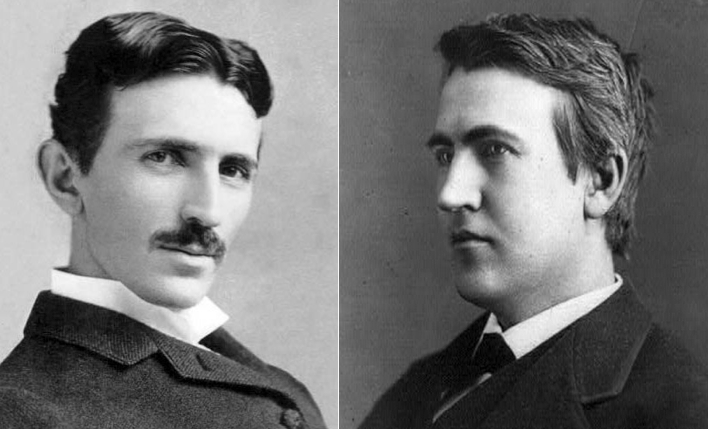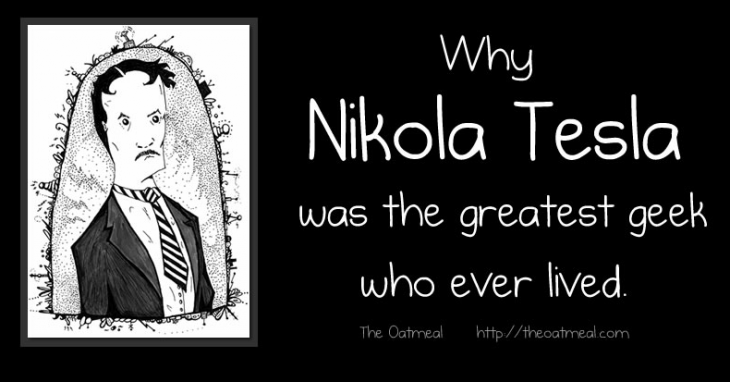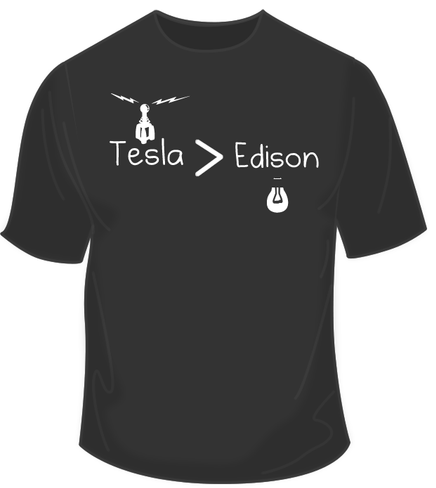 Nikola Tesla (left) and Thomas Edison, both about 1880
Nikola Tesla (left) and Thomas Edison, both about 1880
Nikola Tesla vs. Thomas Edison: who ya got?
Their long battle, played out in the harsh glare of the electric spotlights they helped invent, is back for another round this month, courtesy of popular cartoonist The Oatmeal.
Last week he published a funny and foul-mouthed screed philosophical review, hailing Nikola Tesla as “the greatest geek who ever lived” and crediting him with the invention of radio, radar, transistors, remote control, radio astronomy and wireless communications.
 The Oatmeal
The Oatmeal
The Oatmeal also angrily called Thomas Edison a “[naughty word] idiot” and a “bloated, misguided [naughty word]” and said that Edison didn’t invent the light bulb.
Thus The Oatmeal joined a proud line of writers, historians and idealists who have concluded that a) Nikola Tesla is underappreciated, and b) there must be a truly evil villain responsible, and that villain is Thomas Edison.
Our own Mr. Hehn wrote about this phenomenon a few years back:
“‘Forgotten by the history books,’ they always say about Tesla. But I’ve heard about Tesla since I was a kid in the 1960s. Yes, I heard more about Thomas Edison, but I knew who Tesla was while I was growing up. I never heard word one about George Westinghouse or Philo T. Farnsworth, by the way.
The Edison-as-villain angle plays a lot like the popular origin story of Apple Computers, with Tesla in the role of nice-guy genius Steve Wozniak and Edison cast as a soulless, money-grubbing Steve Jobs. (The light bulb was the iPhone of its day, after all.)
And there’s truth there. Nikola Tesla did hire on to work for Thomas Edison, and they did clash, and Edison did stiff Tesla on money due, and Tesla did go off on his own and invent great things. And Edison was a hard-driving money-hungry businessman and Tesla was terrible with money.
All that said, it doesn’t mean that Thomas Edison was pure evil and a total phony, or that he shouldn’t get a lot of credit for inventing a light bulb that actually worked and could be mass-marketed in a practical way.
Alex Knapp of Forbes pointed this out in a rather polite response to The Oatmeal, in which he concluded that “Tesla wasn’t an ignored god-hero. Thomas Edison wasn’t the devil. They were both brilliant, strong-willed men who helped build our modern world.”
Now the Oatmeal has pushed back in his own response to Knapp, not giving much ground (and not being so polite). He doubles down on his insistence that Tesla is an “unsung hero” and Edison is a “cat-killing-overrated-inventor-[naughty word].”
Also, he’s raised the ante with a funny t-shirt:
 TheOatmeal.com
TheOatmeal.com
The t-shirt is awesome, the push-back not so much. The Oatmeal sounds tetchy. He admits to certain errors, but insists that to point them out is “sharpshooting” in an effort to undermine his greater glorious truth. He says defiantly, “I’m a comedian and I speak in hyperbole. If you sharpshoot my work you will find I exaggerate for the sake of comedy.”
In other words, “If I don’t tell the exact truth while arguing a larger point, it’s your fault for noticing and caring.”
Comedian David Sedaris said the same thing, of course, when Alex Heard pointed out that his funny “true” stories actually weren’t true at all. Sedaris called Heard “incompetent” and explained it away with the line, “To say that a humorist exaggerates to get big laughs, I don’t see how that’s big news.”
The point, naturally, is that if you’re convincing the next generation that Tesla is an angel and Edison is a demon, you should get the facts right. I suspect The Oatmeal (and Sedaris, too) secretly knows this, but would just rather not deal with it because it gets in the way of being hilarious. (Does it ever!)
Fudging the little facts because you “know” you’re right on the big picture is always the first step on the road to calamity. That’s probably how Bernie Madoff got started cooking the books, and it was the M.O. for many other well-meaning businessmen, psychics, dictators and illustrious dopes through history.
The thing is, I’m sympathetic to how bland-ifying it can be to get facts perfectly right. Biographers run up against that all the time. It’s so much more fun to say “Edison invented the lightbulb” than it is to explain that many other people had worked on similar ideas and etc, etc. In our Edison bio we give him credit for inventing “the first practical long-lasting light bulb,” a carefully-crafted phrase that is less catchy but more accurate.
James Watt didn’t invent the steam engine, he improved the steam engine. The Wright Brothers didn’t invent the airplane, they were the first to build and fly “a manned, motor-powered, heavier-than-air craft.” And so on.
It’s less fun, but when you’re celebrating or defaming someone, living or dead, you owe it to them and to readers to get it right.
I also think The Oatmeal is talented enough that he could have kept his funny mojo and have gotten the facts totally right. He might even have left out a few of the naughty words about Edison… although there we go messing with the humor again.
As for the issue of Tesla being “forgotten,” that’s probably a losing battle. Not that Who2 won’t keep fighting it:
“I’m demanding the world stop referring to Nikola Tesla as “forgotten.” You simply can’t keep talking about someone for years and years as being “forgotten.” We all know Tesla was a brilliant guy who got rooked by Edison and died broke and alone in a hotel room. Thousands of people turned out for his funeral in New York City, so he wasn’t exactly forgotten at the time of his death, either.”
Give it another 120 years and I’m sure this will all die down.
